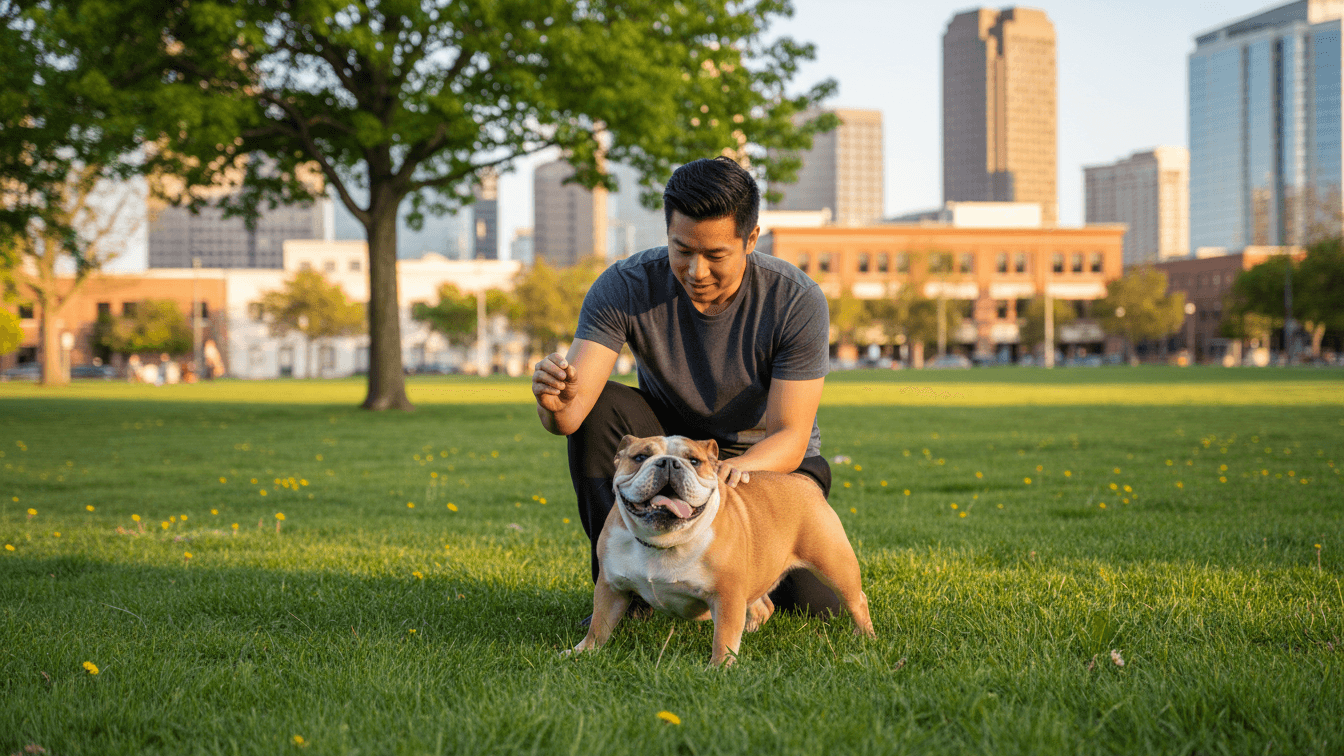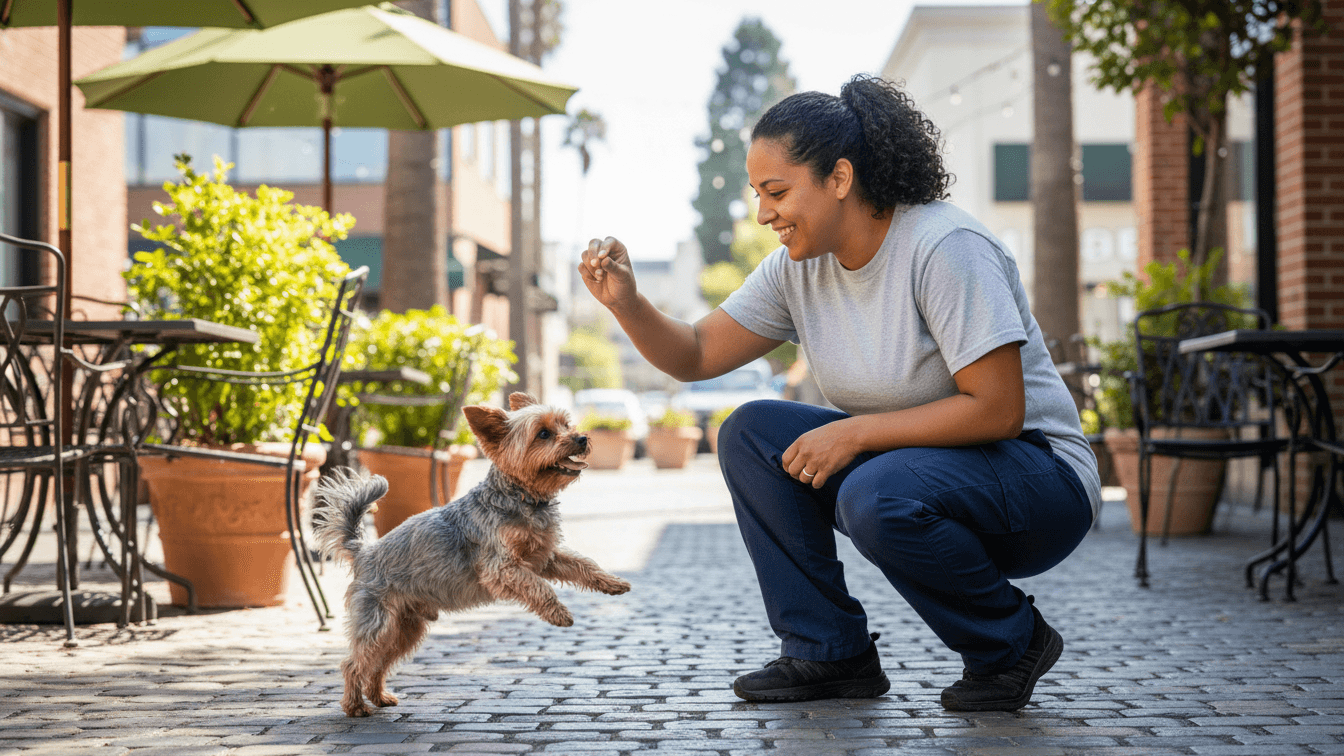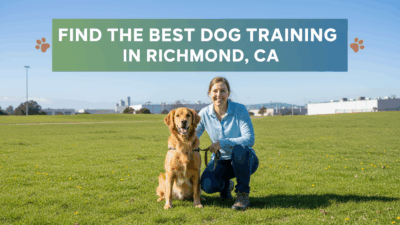Your Complete Guide to Choosing a Dog Trainer in Richmond, CA and Surrounding Areas
Living with a dog in Richmond means navigating a diverse urban environment that stretches from the Marina Bay waterfront to the historic Point Richmond neighborhood. Your dog needs to handle Bay Trail crowds, stay calm near BART stations, and remain polite when you’re exploring downtown or visiting local businesses along Macdonald Avenue.
Richmond sits in Contra Costa County, where local regulations blend city ordinances with county animal control guidelines. When you find a trainer who understands these specific requirements, you’ll see better results whether you’re walking through Nicholl Park or socializing at a local pet-friendly cafe.
How to Choose the Right Trainer
Start by looking for someone who uses positive reinforcement training and can build a plan around your Richmond lifestyle. This means your dog should learn to walk calmly past construction zones, handle ferry rides to San Francisco, stay focused near busy transit hubs, and greet neighbors politely in mixed-use areas.
Credentials give you a quick way to compare trainers’ experience levels. Common dog trainer certifications include KPA-CTP, CPDT-KA, or IAABC-CDBC for behavior problems. If your dog has serious aggression issues, look for someone with CBCC-KA or a science-based program like CTC.
In-home dog training works great for puppy manners, door greetings, and neighborhood leash skills. Group classes make sense once your dog can focus around other dogs, especially before you try busy spots like Marina Bay Park on weekends.
Common Dog Training Methods Explained

Reward-based methods build the trust you want while creating lasting behavior changes. They also help you follow Contra Costa County’s rules about keeping dogs under control in public.
Basic obedience covers sit, down, stay, place, recall, and leash training so your dog can handle walks, outdoor dining areas, and park visits without pulling or jumping on people.
Puppy training focuses on socialization, potty training, bite control, crate comfort, and early leash skills. Starting with short, positive training sessions prevents bad habits from forming in the first place.
Behavior modification addresses fear, reactivity, resource guarding, or separation anxiety through careful desensitization and counterconditioning. For serious cases, ask if your trainer works with local veterinarians.
Private lessons and in-home sessions let you customize everything around your daily routines, while day training can speed up results when you’re short on time.
Dog training classes help your dog practice good manners around other dogs and people. The best classes give dogs plenty of space, screen participants carefully, and teach calm behavior rather than just excitement.
Specialized training like therapy dog training or service dog training requires extra structure, public-access skills, and a very clear step-by-step program.
Stay away from trainers who use fear, intimidation, or pain to get results. Humane methods are safer for everyone, easier to maintain long-term, and much better for keeping peace with your neighbors.
Average Cost of Dog Training in Richmond, CA (Updated for 2025)
Prices around Richmond and Contra Costa County depend on the trainer’s experience, how long sessions last, and where the training happens. Here’s what most local pet owners are paying in 2025.
| Service Type | Average Cost (Richmond/Contra Costa County) |
|---|---|
| Puppy classes (4-6 weeks) | $160-$290 total |
| Group obedience classes (4-6 weeks) | $170-$310 total |
| Private lessons (60-90 min) | $120-$200 per session |
| In-home coaching packages (4-6 visits) | $450-$950 total |
| Day training (trainer works your dog + handoff) | $475-$1,000 per week |
| Behavior consult for reactivity/anxiety (initial) | $160-$275 |
| Board and train (2-4 weeks) | $2,200-$4,800 total |
You’ll probably pay extra travel fees for longer distances within Contra Costa County, and expect higher rates for complex behavior work.
Make sure you understand what’s included, how the trainer tracks progress, and whether they offer a free consultation before you sign up.
Questions to Ask a Potential Dog Trainer
- What training methods do you use, and how do you keep sessions positive and low-stress?
- What credentials do you have, like CPDT-KSA or other certifications? Do you keep up with continuing education?
- How will you customize the training program for my dog’s specific needs and our Richmond lifestyle?
- Do you offer in-home visits, group classes, or day training, and which approach fits my goals best?
- How will we measure my dog’s progress and know when to add more distractions?
- What are the total costs, including any travel fees, and what’s your cancellation policy?
- Do you carry liability insurance, and can you show me proof?
- For behavior problems, will you work with my veterinarian if needed?
- What should I practice between our training sessions to help your dog keep improving?
Local Richmond Rules and Considerations
Richmond enforces leash laws and nuisance rules to keep parks and neighborhoods safe for everyone. Contra Costa County follows California’s public health requirements too.
Leashes are required in all public spaces except inside designated off-leash dog parks. Keep a standard 6-foot leash with you for Bay Trail walks and community events.
California law requires current rabies vaccination for all dogs over four months old. Richmond requires dog licensing through the city, and you can register your dog through the Richmond Animal Services website or by visiting their office.
Excessive barking can be considered a nuisance under Richmond’s noise ordinance, so work with your trainer on alert barking and separation anxiety before neighbors start complaining. If your trainer wants to use city parks for commercial sessions, they may need permits and proof of insurance.
California doesn’t require special licenses for dog trainers, but professional dog trainers should carry liability insurance and follow local business regulations. Anyone offering board and train services must comply with state kennel regulations.
Contra Costa County Animal Services provides information about lost pets, microchips, spay and neuter services, and other county resources at their main facility in Martinez.
Local Richmond Resources for Dog Owners and Surrounding Areas
These spots give you great places to practice polite manners, work on recalls, and provide safe enrichment for your dog. Always follow the posted rules and etiquette guidelines.
- Point Isabel Regional Shoreline in nearby Richmond/Berkeley border offers one of the largest off-leash dog parks in the country with direct bay access and wide-open spaces for recall practice.
- Shimada Friendship Park Dog Park provides a fenced area in central Richmond with separate sections for different dog sizes.
- Marina Bay Park Dog Park gives waterfront access with fenced areas and beautiful views, perfect for socialization and training for dogs around distractions.

FAQs
How much does in-home dog training cost?
Most Richmond trainers charge $120-$200 per in-home visit, with discounts available when you buy packages. Behavior problems typically start at the higher end of that range.
Is in-home dog training worth it?
Absolutely, because you’re working on problems exactly where they happen. Your trainer can fix door manners, jumping on guests, counter-surfing, and yard reactivity right at home, then step outside to practice leash skills on your actual neighborhood sidewalks.
Can you pay someone to house train your dog?
Yes, many trainers offer puppy programs that include potty training, crate routines, and daily schedules. Day training can speed up the process while teaching you how to maintain the progress.
What is the 3-3-3 rule for dog training?
This is a helpful timeline for new or adopted dogs: expect about 3 days for your dog to decompress, 3 weeks to learn your routines, and 3 months to feel completely settled. Good dog obedience training plans work with this natural adjustment period.
How long will it take to reach my training goals?
Most puppies and friendly adult dogs show solid progress within 4-8 weeks if you practice daily. Fear, reactivity, or aggression typically requires several months of careful behavior modification with gradual increases in difficulty.
What should I bring to group classes?
Pack a flat collar or harness, a 6-foot leash, high-value treats, water, and current vaccination records if your trainer requests them. Leave retractable leashes at home for safety reasons.
What’s the leash law in Richmond?
Dogs must be leashed and under control in all public areas, except inside designated off-leash dog parks. Keep that 6-foot leash handy for city streets, parks, and the Bay Trail.
Do I need a dog license in Richmond or Contra Costa County?
Yes, Richmond requires all dogs over four months old to be licensed annually. You’ll need proof of current rabies vaccination to get your license through Richmond Animal Services. County regulations also apply if you live in unincorporated areas.
What shots does my dog need in Contra Costa County or California?
Rabies vaccination is required throughout the state for all dogs over four months old. Your veterinarian may also recommend distemper-parvo, bordetella, and leptospirosis based on your dog’s lifestyle and exposure risk in urban areas.
Are dog trainers required to be licensed in Richmond or Contra Costa County or California?
No special trainer licenses exist in California. Professional dog trainers follow normal business regulations, but if they offer boarding services, their facility may need to be licensed and inspected by the state or county animal control.
Where can I practice off-leash recall?
Use fenced dog parks in Richmond like Shimada Friendship Park Dog Park or Marina Bay Park Dog Park to keep things safe and legal. Point Isabel Regional Shoreline offers extensive off-leash areas where you can practice with more space.
Which dog parks allow training around Richmond and surrounding areas?
Shimada Friendship Park Dog Park, Marina Bay Park Dog Park, and Point Isabel Regional Shoreline all allow off-leash play and training within their designated areas. Try visiting during quieter weekday mornings when you’re starting out.
What beaches or trails allow dogs for training?
Point Isabel Regional Shoreline welcomes off-leash dogs along its waterfront trails and beach areas, making it perfect for training around water, birds, and other distractions. The Richmond Bay Trail allows leashed dogs along its entire length, providing excellent opportunities to practice calm focus around cyclists, joggers, and families.
What if my dog shows aggression toward people or other dogs?
Work with a certified dog trainer who specializes in aggressive dog training and behavior modification. Look for someone with advanced credentials who uses desensitization techniques and can create a safe management plan while you work through the issues.
Can I train my dog to be a service dog in Richmond?
Yes, but service dog training requires extensive work to meet public-access standards under the Americans with Disabilities Act. You’ll need a structured program that covers obedience training, task work specific to your disability, and extensive socialization in all types of public settings.
Do trainers offer a free consultation or free evaluation?
Many trainers in the Richmond area offer a free consultation or free evaluation to discuss your dog’s needs, explain their methods, and answer questions before you commit. Always ask about this when you first reach out.
The right combination of thoughtful planning, humane methods, and consistent practice around Richmond’s parks and neighborhoods will help your dog become a confident, well-behaved dog. If credentials matter to you, don’t hesitate to ask about dog trainer certifications and how your trainer stays current with new dog training services and techniques.
